Lonely Heart
|
COMMENTS - 2
Lonely Heart
|
COMMENTS - 2
In the un-humbled opinion of one, Poetic Justice...
"She was alive, she was trying to breathe.
I looked in her eyes and she looked like she was dying."
-- Sean Stanek
Tell Them Willie Boy
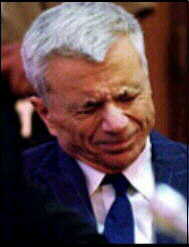
Took the Fifth
the defense rests
February 23,
2005
It was unbearable agony.
Ambushed and attacked by treacherous villains, the wounded victim bemoaned
cruel fate while waiting to die. The victim cries out in pain:
"For the past year, I have been silent while this town and my country
and the police said whatever they want about me. Now it is my turn to fight
back. This is my right to fight back for my life. For the past year, practically
everybody had tried to take that away from me, the news media who I once
respected, the police who I once respected, my country who I once respected."
Yes, according to Robert Blake, he's the victim in this case, but
the once, semi-famous psuedo-celeb vowed not to go gently. He swore to rage
-- rage against those who were plotting to snuff him out. Although his legal
advisors reminded him of his Fifth Amendment privileges, Robert was dying
to talk.
The faded star was so determined to shine again; he agreed to do television
interviews about his wife's murder. Blake's need to talk cost him the loss
of top-notch attorneys, but whatever the price, he had to tell his side of
the story.
So when the defense rested its case without calling Mr. Blake to the stand,
the courtroom fell silent.
What happened to their star witness? Where's the rage? The fighting back?
The revenge? What became of the testimony that was going to clear all this
up? The stranger with the crew cut? The corrupt police? The Lonely Hearts
stalkers? The truth?
To be sure, defender Gerald Schwartzbach called quite a few witnesses to
try and blow holes through the State's case, but they all missed the target.
None of those people were there with Bonny Lee Bakley when she was shot to
death. No one except Robert could explain what really happened on that awful
night. Yet the highly publicized defense presentation came and went -- and
the whole time, Robert Blake remained silent. He said nothing to his jury.
He didn't even offer them a song.
C'mon Robert! Grab a guitar and give us a quick chorus of "You Are My Sunshine."
"As long as the police don't
try to fabricate evidence, I have nothing to worry about."
-- Blake
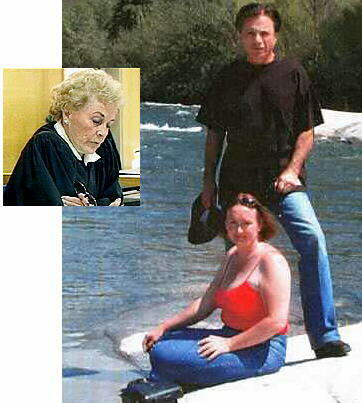
Behind the Mata Hari Ranch
Between 1,500 and 2,000 women in the U.S. are scheduled
to be murdered by their partner or ex-partner this year -- and every year
if the trend continues. The fact is, every woman who has a husband or a boyfriend
is "playing with fire." We are in a war on Domestic Terrorism and
we are losing.
One would have to go all the way back to Adam and Eve to root out the misogyny
that has manifest itself in the Blake case, and which makes quotes like this
gem from dismissed co-defendant, Earle Caldwell, acceptable: "Bonny Lee
ripped off so many men -- it was inevitable that one of them would eventually
come after her."
One of them did come after her -- Robert Blake.
The 4,909-square-foot million-dollar mansion that Blake lived in had seven
bedrooms and six bathrooms. He named it the "Mata Hari Ranch." Bonny
Lee Bakley never lived in that mansion. She moved into a small bungalow on
the property. Five days later Bonny was dead.
Of course you remember who Mata Hari was. She was the one-time "nude dancer"
turned spy whom at a French show trial was called: "one of the greatest
spies of the century, responsible for the death of tens of thousands of
soldiers."
Mata Hari was instantly found guilty and was shot to death by a firing
squad.
"It's because of Bonny that
Rosie was born. It was her will and her conviction, not mine, and her dedication
-- not mine, that brought Rosie into this world. I thank God and I thank
Bonny. I stand before God and make this pledge: As long as I have breath,
I will do everything to make Rosie's life the best that I can."
-- Blake
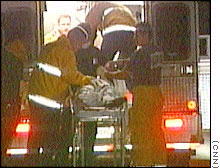
Fade to Black
the prosecution rests
February 14, 2005
Initially, stuntman, Ronald "Duffy" Hambleton,
thought old Bobby Blake had arranged their March 2001 meeting to discuss
ideas for a movie, but it quickly became clear Blake wanted to discuss ideas
for a murder.
"We're going to have to get rid of my wife," Blake told him.
Taking the stand, Ron Hambleton said, "He asked me specifically what my services
were going to run. I told him there'd be no reason for me to go into any
price structure because it was not for sure I would be the one involved."
After listening to Blake's assortment of set-ups to pop, whack,
or snuff Bonny Bakley ("... he used many different adjectives for
how he wanted her taken care of..."), the stuntman pointed out an obvious
flaw shared by all of Blake's plots -- Blake was in every scene. Hamilton
quoted the faded 1970's celebrity as saying:
"Don't worry about it.
I'm an actor, you know,
I'll take care of it."
"He told me that he would have gone to the Mafia --
that he had tight contacts," the witness testified. "But by doing so, they'd
have a hold on him for the rest of his life, so he decided that wouldn't
be a good idea."

It was because of "Duffy" that police sought out records from a prepaid telephone
card that documents 56 calls from Blake to the stuntmen. "I suggested he
purchase a calling card," Hambleton said. "I explained you wouldn't be able
to trace the calls."
Hambleton noted the last time he spoke to Robert was hours before Bonny was
killed.
The two Hollywood veterans met a total of three times. Hambleton told jurors
at one point, Blake produced a small gun and said, "In the event I needed
a gun, this one was unregistered, or a throw-away."
What's My Motivation?
Mr. Blake wanted "Duffy" to think his bizarre plans
to get rid of Bonny Bakley were designed to protect his newborn baby. He
told others the same thing. Evidence put before the jury however, clearly
shows that Blake felt tricked and betrayed by Bonny's pregnancy, and that
he repeatedly demanded she have an abortion.
When Mr. Blake didn't get his way, he vowed revenge. It came in the form
of an ongoing mini-series of staged intrigues, snares, frauds and elaborate
schemes to trap and then annihilate Bonny Bakley.
In a letter written shortly after the birth of their child, Bakley indicates
Blake told her he knew someone who wanted to buy their daughter, Rosie, for
$100,000. Bakley wrote, "I knew it was you just trying to get rid of me,
thinking that would be cheaper than paying child support in the long run."
Months later -- after Blake's attempt to kidnap Rosie -- he took Bonny out
to a restaurant and during lunch, two police officers came to the table.
They ordered Bonny to return to Arkansas immediately and face authorities.
It turns out the policemen were actually Hollywood actors Blake had hired
for yet one more of his low-life scams to get revenge on Bonny.
Blake wasn't intent on saving Rosie from "child prostitution," he was obsessed
with destroying Bonny. Hambleton and the other 61 State witnesses have testified
to that.
If You Want It Done Right
Beleaguered defense attorney, Gerald Schwartzbach did
his best to show State witnesses in a bad light, suggesting they were gang
members, or fantasizing drug-abusers, or just plain liars. Unfortunately,
revealing the shady character of some of Blake's associates only serves to
make Blake look worse.
Nothing the defense team does can change the fact that Blake spent a great
deal of time and a great deal of money to get back at his wife, and when
he couldn't find someone to finish the job -- he finally killed Bonny Bakley
himself. Regardless of how much crystal-meth the defendant's old pals may
have been smoking, no one on the very sober jury could see the evidence any
differently.
The prosecution rests, not on the word of un-sure witnesses, but on the words
of a very certain Robert Blake, who told Ron Hambleton, "Well, if you're
not going to do it, then I sure as hell am."

It's a Wrap
"You swore to me on your life that no matter what I didn't have to worry,
and that was a rotten, stinking, filthy lie and you deliberately got pregnant.
Your period ended on August 20 and you were out here fucking me on the exact
day you were supposed to. For the rest of your life you'll have to live with
that and for the rest of my life I'll never forget it!"
-- Blake
"Murder is usually a highly
motivated thing."
-- Harland Braun
"I hope wherever Bonny is
that she can see all this.
Because this is what she always wanted --
to be the center of attention. She would love this."
-- -- Linda Gail Lewis, 2001
| Different
Story, Same Plot
During his tour of military duty in
Alaska, Robert Blake fell deeply in love with a 16-year-old girl who lived
near the base. Because of the girl's father's disapproval over the relationship
and the fact that her father wanted Blake prosecuted for statutory rape,
Blake, by his own admission, began plotting her father's murder. "I know first hand how it feels to have the mind of a killer, because I nearly became a murderer myself," Blake later said of the incident. "…I went crazy. I just didn't know I was crazy. In a sense her father wanted to take my life. So in my mind, I decided to take his first." |
ALL FIRED
UP
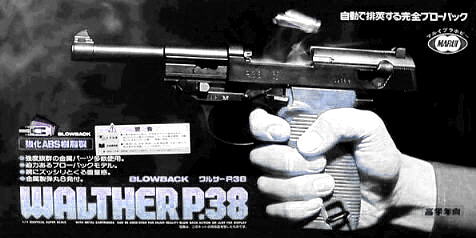
On
the night of Bonny Bakley's assassination, supervising detective, Ronald
Ito, told other officers,
"Everything circumstantial is going
against Mr. Blake." Three and a half years
later, as the fifth week of Bonny Bakley's murder trial gives way to the
sixth, Detective Ito's assessment still holds.
February 9
boom, boom
Using prosecutor Shellie Samuels in the role of Bonny Lee Bakley, crime scene
reconstruction expert, Rod Englert, held steel rods up to Samuels'
cheek and shoulder to show the trajectory of the killer's bullets which he
said were fired in rapid succession from "a few feet away."
"Common sense tells you these were rapid-fire shots, down to up," he said.
"They have to be very rapid, boom, boom. Otherwise the body would seize up."
On cross, Schwartzbach suggested that the discovery of a bullet casing inside
the car means Bonny's killer was right-handed, while Blake is left-handed.
The Nazi-issue Walther P38 used to murder Blake's wife, ejects casings to
the left.
Englert told jurors casings can land in different places for different reasons.
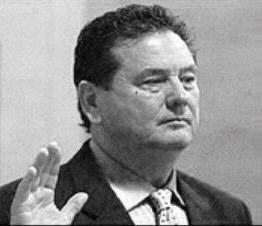
pop, pop
Ex-Baretta stuntman, Gary "Whiz Kid" McLarty
finally entered the picture.
Mr. McLarty, once known as "the King of Bash and Crash," is no stranger to
danger. He was stunt coordinator for "Twilight Zone," the 1983 movie in which
three actors were killed by a helicopter used in the film. In 1991, McLarty
shot and killed Donald Louis Deppe during a confrontation. The DA ruled the
shooting a case of self-defense.
Taking the stand against Robert Blake, Gary McLarty repeated much of the
same crushingly strange testimony he gave at pre-trial.
The aging stuntman said Blake phoned him and arranged a meeting in March
2001, where Blake outlined four possible murder scenarios to kill
his "celebrity-stalking grifter" wife.
Stage a robbery and kill Bonny in the guest house behind
Blake's mansion. "Blake opened the back door and showed how somebody could
go inside and -- I believe he talked about going up a set of stairs at night
-- and pop her . . . Pop, pop."
Blake would take his wife for a walk behind a casino
in Laughin, Nevada. "Someone could be waiting by the river."
After getting Bakley on a highway, Blake would pull
over to urinate, while someone in a different car could sneak up and kill
her.
Blake would take Bonny to dinner, then arrange for her to be left alone in a car outside the restaurant where she could be easily shot.
Despite a very long afternoon being questioned by Mr. Schwartzbach about
cocaine, extra-terrestrials, and notorious Hollywood homicides from the past
-- the stuntman stuck to his guns. McLarty said Blake talked of needing a
silencer, and mentioned a possible payment of $10,000. Blake phoned him a
few days after the meeting and again spoke of Bonny Bakley's assassination.
Schwartzbach got the witness to concede that Mr. Blake never explicitly asked
him to be the hitman, but McLarty testified it was clear Blake wanted Bonny
Bakley dead.
kill, kill
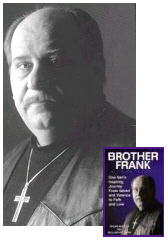
State witness, Frank Minucci, (AKA
"Brother Frank")
testified that during a telephone conversation, Blake bitterly complained
about a "broad" who was pregnant. "I said, 'Maybe you should marry her.'
He said, 'I'll kill her and the kid.'"
"He sounded all fired up. He said he had a house in the back of his
house and he had something really heavy for me to do. He had a blank check
signed. He was screaming about a broad." Minucci testified.
"I said, 'What are you talking about? You want me to whack somebody?'"
Referring to a 1993 movie in which Minucci played a mobster character named
Tony Taglialucci, Blake responded,
"I
want this guy from 'Carlito's Way.'"
Asking one question too many, Schwartzbach asked whether Minucci had told
police, "If you made a list of all the people Blake wanted whacked he would
need a roll of toilet paper."
Brother Frank corrected the defense attorney -- he told police Blake
had said that.
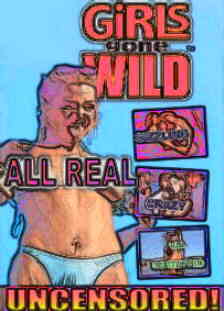
Playing with Fire
February 1, 2005
Robert Blake's die-hard defenders say Bonny Lee Bakley
was "playing with fire" for decades -- turning men on and then ripping them
off in a pornographic moneymaking scam -- so it's impossible to say which
one of her dozens of enemies finally burned her. They contend Bakley was
a dead woman walking, and point to the shocking claim that she had 100 husbands.
Bonny Bakley did not originate the concept of taking money from horny old
men and sending them dirty pictures.
It's been estimated that the porno -- er … "the adult entertainment
industry," which is largely based in the San Fernando Valley, had a gross
profit last year of over $10 billion. This year, Americans will spend $4
Billion on the rental and purchase of pornographic videos alone. Bonny Bakley's
back-of-the-magazine, classified ad con seems almost quaint here in the golden
age of world-wide porn and on-demand digital filth.
It's the height of absurdity to characterize the men who happily throw away
their money on X-rated fantasies as the innocent victims of porn.
Lonely Heart Attack
No one knows exactly what scams Bonny Bakley was running, or why -- but she
was certainly not a violent person. No witness will testify that Bonny ever
assaulted or threatened the men she was in contact with, or desired to cause
them any harm.
Whatever money she was able to swindle out of these losers, she got because
they willingly mailed her a check. Most often the checks were very small
-- $20 or $25 -- and in return the guy got a phony love letter and a copied
photo of a nude woman who wasn't even Bonny.
Nothing about her low-level "Lonely Hearts" swindle would suggest she was
a likely target for a payback homicide.
If you can't stand the heat...
Blake's spin controllers insist Bonny Bakely was "scum" who slept around
with hundreds of men, and even married them, all in a sleazy scheme to part
the fools from their money. In an effort to make the old buzzard seem innocent,
Bonny has to be portrayed as diabolically evil and Blake's backers point
to her shocking past.
Other than unsubstantiated rumors of sex parties and con games, not much
proof of Bakley's evil has ever been produced. There is however, the sad,
sad saga of old Uncle Demart.
Dawn Dupre, told reporters how Bonny Bakely met and married her aged
uncle, DeMart Besly, then robbed him blind and destroyed his life
-- all within one day. While the cheerless romantic tragedy might be based
on actual events, the time for Ms. Dupre to be concerned was before her uncle
rented a Vegas hotel room with a total stranger he'd met through a swinger
magazine ad -- not after.
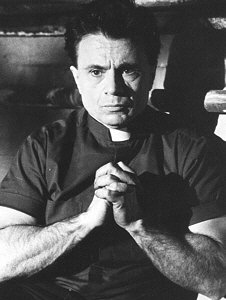
The same heated critics who insist Bonny was "playing with fire" and deserved
to get burned, somehow don't think that rule applies to them -- or their
uncle. They're pure and innocent, and they want revenge!
Ms. Dupre announced that, before DeMart Besly died in late 2000, he had penned
a tell-all book about the torture he suffered at the hands of:
"Ubiquitous Bonny: Mistress of Sham,
of Lust, Greed and Deceit."
Uncle DeMart's delightfully descriptive title is eerily similar to some of
the over-the-top phrases Blake had for Bonny. ("Trailer park tattoo people")
But no one can top the great Harland Braun who said, "She spent a quarter
of a century abusing men . . . She was absolutely evil."
Well, maybe so, but then that doesn't say much for the obsessed Mr. Blake,
or any of Bonny's other innocent, hoodwinked victims. We all get what we
deserve. All of us. And if you play with fire, you don't deserve revenge
-- you deserve to burn.

American
Idle
January 30,
2005
Bouncing, breakdancing and spinning out of control,
Leroy Wells performed for
celebrity judges -- Paula, Randy and Simon -- and all of American Idol's
millions of TV fans last week. Appearing on the show as one of the most
entertaining performers NOT to survive American Idol's open auditions, Leroy
was a laugh riot with his poly-rhythmic rap, rubber legs, goofy grin and
periodic primal scream: "Can you dig it?"
Watching the furiously funky young man from Grand Bay, Alabama, one suspected
he had way too much time on his hands and that the dangerous energy Leroy
displayed on television -- might not be so amusing to witness in the real
world.
Idol's judges played along. Even the eternally sour Simon finally threw up
his hands and laughed, but they seemed more than a little nervous having
to tell the boisterous B-boy he hadn't won the competition.
They had good reason to be fearful.
By the time the show aired, Leroy Wells was in jail, having been arrested
earlier this month for allegedly
discharging a firearm into an occupied
vehicle, and shooting a man in the leg.
Way too much time on his hands. Can you dig it?
American Idol's Alabama rapper has quite a rap sheet -- seven previous arrests
on various charges of disorderly conduct, illegal drugs and possession of
unlicensed firearms.
Tragedy -- true tragedy -- is at the heart of comedy.
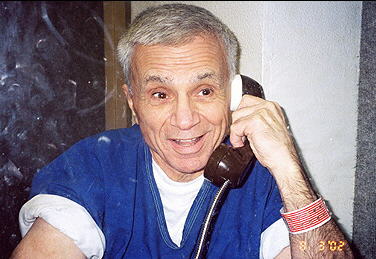
Robert
Blake has fascinated America for decades with his dangerously funny postcards
from the edge of disaster. Not unlike Leroy Wells, Blake's erratic performances
strangely captivated his TV audience.
As a regular on the late, great, Johnny Carson's "Tonight Show," Blake revealed
his own experiences with disorderly conduct, illegal drugs and firearms.
Blake once remarked, "I wore a pinstriped suit and carried a gun. I did
time in jail. One night when we were robbing a liquor store, a cop almost
blew me away."
Speaking of his parents, Blake said, "Being locked in the closets and
beat up and burned and sexual stuff, and to come out from under it. I mean,
it's lovely. Most people like me end up on death row, or in the graveyards,
or prison."
He's somehow managed to avoid death row, but based on the shocking circumstantial
evidence presented against him in the first month of trial, Blake was right
to suspect he'd die in prison.
"He was personally responsible
for a great many wonderful
things that happened in my life. When I was arrested, he was
the very first person who came out and spoke on my behalf."
-- Blake about the Jan. 23, 2005 death of Johnny
Carson
Take my wife -- Please?
Robert
Blake's fixation with developing sensational plots to destroy Bonny Bakley
was so fanatical, the trial's scene-by-scene review of the horror -- borders
on the comic.
Not that there's much humor in Blake's self-indulgent descent into madness
and murder, but he had so many different sub-plots -- each worse than the
last -- and so many poorly cast characters -- the deadly serious evidence
in Bonny Bakley's trial is playing like the script of a "film noir" farce.
But cheesy, sleazy, B-grade, made-for-tv stunts designed to get back at Bakely
were not enough for Robert Blake. Performing the sinister scenes of entrapment,
treachery and degradation were fun, but he also wanted the thrill of killing
her.
That's why no one in the Van Nuys courtroom is laughing much.
What obviously began out of sheer boredom and idle revenge, became an obsession
for Blake. He put a staff of people together in his quest to manipulate and
control Bonny. And I wonder -- had she survived the Vitello's murder scene,
would Bonny Bakley ever have been able to laugh about it? Would she think
it was laughable that Mr. Blake went to such extraordinary extremes in his
total obsession with her?

Bakley's eldest daughter
Holly Gawron, 24,
told the jury Blake became furious and threatened Bakley when he discovered
she was pregnant, yelling "You don't know who you're messing with, you bitch!"
Gawron and her brother found a tackle box packed with cocaine in the back
seat of their mother's car which was apparently planted there by Blake or
one of his gang members.
Former Bakley attorney,
Cary Goldstein
testified Bonny signed a temporary child custody pact and a prenuptial agreement
which, among other things, stated that if she called off the wedding, she
risked losing custody of her baby, Rose.
"It was an extraordinarily lopsided agreement . . . In my career I have never
seen an agreement like this -- that is as abusive and controlling as this,"
said Goldstein. "I would never allow my client to sign off on this."
Retired stuntman, Roy Snuffy
Harrison, told jurors Blake requested the
phone numbers of two other men to discuss Blake's scheme to murder
Bonny.
Blake told his
personal assistant,
Cody Blackwell to play a role in his kidnapping.
She was to pretend to be a nurse.
"All of a sudden I went from Cody to Nurse Nancy . . . It was to make Bonny
feel more comfortable to leave the baby with me."
After the cleverly staged ruse to steal Baby Rose -- whom he had once desperately
tried to have aborted -- Blake told Blackwell he was no longer in need of
her services.
"Why didn't I go to the police? I was scared," Blackwell offered. "I knew
I had just been involved in a kidnapping. Then I thought, 'Oh my God, he's
killed her."'
"He told me that he'd met
a girl in a jazz club,
that they had a one-night stand and she turned up pregnant . . .
He wanted to do something about it."
-- William
Welch
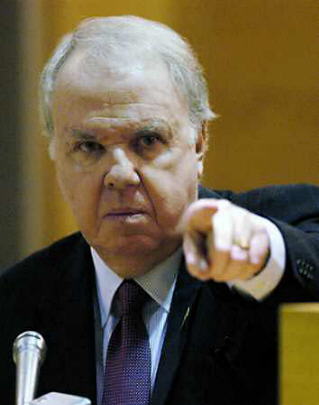
Welch Takes the
Stand
January 20, 2005
Welch: "He said, 'I've been thinking about this. We're going to hire a doctor and abort her and if that doesn't work we're going to whack her.'"
DA Samuels: "What did you take that to mean?"
Welch: "Kill her."
DA Samuels: "And what did you say?"
Welch: "Robert, are you out of your fucking mind?"
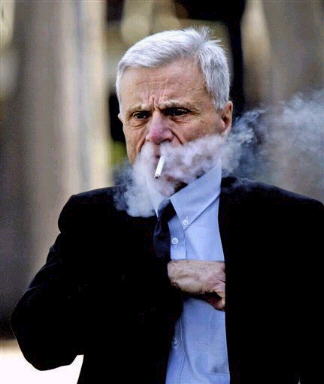
Book 'em, Danno
January 20, 2005
Former L.A. Times reporter, Miles Corwin signed
a "ride-along" agreement with the LAPD, which gave him complete access to
the Robbery Homicide division. The author used details of several cases,
including Bonny Bakley's murder for his book, "Homicide Special: A Year with
LAPD's Elite Detective Unit."
Along with access to the Bakley crime scene, Corwin was allowed to be at
police strategy meetings, witness interviews, and even a search of Blake's
home.
Schwartzbach: "Within hours of the murder, the detectives expressed the opinion in your presence that Mr. Blake had killed Miss Bakley?"
Corwin: "Yes, that he was a key suspect. But to me, that just seems to be standard detective reaction -- that when a woman is murdered her husband is usually a suspect."
Schwartzbach (quoting from Corwin's book): "Was it standard detective reaction to say that a suspect is 'full of shit?'"
Absence of Evidence . .
.
Crime scene investigator, Rod Englert, who analyzed the blood-spray
patterns inside Blake's Dodge Stealth, said Bonny Bakley was shot twice while
sitting in the car -- once in her right cheek and once in her right shoulder.
He testified blood patterns reveal that although Robert Blake did not have
blood on his clothes the night of his wife's murder, the person who killed
Bonny Lee Bakley would not have been sprayed by her blood.
"Whoever shot Bonny Lee Bakley would not have blood on their clothes?" prosecutor
Shellie Samuels asked.
"Correct," Englert said.
. . . is not Evidence of
Absence
Criminalist Steven Dowell of the L.A. County
Department of Coroner testified that the presence of gunshot residue (GSR)
indicates a person may have fired a gun, was in an environment where a gun
was fired, or touched a surface already containing the particles.
Dowell said GSR was found on Robert Blake's black leather boots, black cotton
T-shirt, Levi's jeans, belt buckle, black socks, and on his hands the night
Bonny Bakley was shot, but said Blake could have picked up the GSR from a
gun that was not the murder weapon -- including the revolver he admitted
he brought to the crime scene.
A View to a Kill
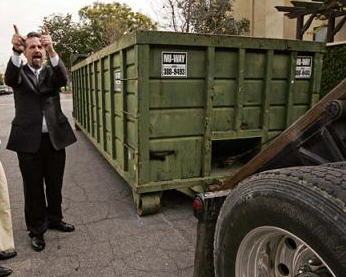
January 15,
2005
On Thursday evening, January 13, Robert Blake returned
to the scene of the crime accompanied by twelve of his peers.
The jury view, which was scheduled to last about 15 minutes, began at the
corner of Woodbridge and Kraft streets in Studio City where the large green
dumpster had been restored to the position it occupied on May 4, 2001. Parked
about 12 feet behind the green bin was a black car -- not Blake's but the
same make and model.
Many who followed the trial of wife-murdering fiction-writer,
Michael Peterson, felt that the
day jurors viewed his bloody staircase marked the beginning of the end for
Mr. Peterson. It may well be that the trip to Woodbridge and Kraft was a
turning point in the case against Mr. Blake.
Press representatives said jurors appeared very interested and were examining
the possible angles from which a shooter could point a gun toward Bakley
through the open passenger window of the car. Then jurors began busily touring
the entire area.

They walked through Vitello's and viewed table #42 where Blake chowed
down the special dish the restaurant had named for him, as well as the men's
restroom where Blake threw it up. They walked the distance back to the dumpster
and criss-crossed the streets, even going over to Sean Stanek's house.
And then they asked to do it all again.
Jurors seemed determined to understand something about the murder of Bonny
Bakley and were doing their own investigation. Finally, after an hour, judge,
jurors, lawyers and a rather dejected looking Robert Blake finished the tour
and left the area.
Mr. Blake needn't be so glum. Many who followed O.J. Simpson's murder trial
feel the jury view in that case started jurors down the road to a verdict
of Not Guilty.
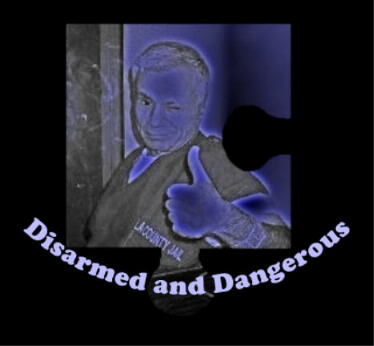
|
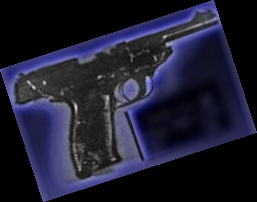
|
Judgment Day
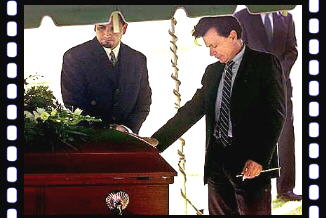
No New Beginnings
Tuesday, December
21
As expected, after the State's attorney gave her opening
statement laying out the case against Robert Blake, the actor's attorney
addressed jurors and laid out the case against Bonny Bakley.
Of course, three and a half years ago Bonny Bakley was judged and instantly
sentenced to death on a dark street corner, so a recounting of her criminal
history is useless to the jury empaneled to try Robert Blake.
Perhaps Gerald Schwartzbach simply wanted to spread blame by spreading
shame, but considering that she's six-feet underground in a coffin, I'm certain
Bonny Bakley feels no shame. The defendant, who once said of Bakley, "I
got to annihilate this bitch," obviously feels no shame hearing his lawyer
denigrate the memory of his deceased wife. During the openings, the Emmy-Award
winning actor -- never known for his subtlety -- anxiously fingered his face,
twisted in his chair, and every so often, bugged out his eyes in disbelief.
(Blake's trademark crowd-pleaser stemming all the way back to his "Our Gang"
days.)
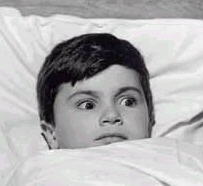
Robert Blake begins
Regardless of the tasteless and irrelevant absurdity, Blake's lawyer spoke
of criminal allegations against the dead victim for much of his long-winded
opening. Shame on him.
Schwartzbach -- curly hair creeping past his chubby cheeks to highlight what
will no doubt be the first of many a bowtie -- then smugly told jurors, "There's
no evidence that Robert Blake shot Bonny Bakley." And that's true. He went
on to say, "There's no direct evidence, but there's also no circumstantial
evidence." That's false.
The circumstantial evidence against Blake is the mud Mr. Schwartzbach had
just spent an hour slinging at the dead victim.
If Blake had nothing to do with the annihilation of Bonny Bakley, why in
the world would he still be attempting to disgrace her? Bakley may have been
a "scandalous low-life" connected to fraudulent lonely hearts scams,
but she was also very connected to Robert Blake -- as his wife and the mother
of his baby girl.
In no way does running down the reputation of the dead victim lift up her
husband, the suspected killer -- but Blake's attorney went on so long he
hadn't finished indicting Bakley when court was adjourned. Schwartzbach had
to continue the next day. Others on the Blake defense team hit list charged
with sleazy and criminal misconduct included Blake's friends, in-laws and
business associates, and naturally -- the LAPD.
Unfortunately for the once-famous actor and his defensive dream team of
co-writers, most of their best stuff fell flat.
Victim Impact
Cool and confident prosecutor Shellie Samuels had solidly blocked
the dramatic impact of the victim's complicated past with devastatingly simple
opening remarks. She aimed to strip away any dark mystery surrounding the
B-Grade, Tinsel Town murder and reduce the case to a tight focus on the dismal
failures of an obsessed man. Samuels got it exactly right.
In the plainest terms possible, the prosecutor told jurors Blake plotted
to have Bonny's baby aborted -- and failed. He then plotted to steal her
baby -- and failed; He plotted to have Bakley arrested and locked away --
and failed; He plotted to have a hitman kill her, and when that plan failed,
Robert Blake made the fatal mistake of thinking he could successfully get
away with the murder himself.
Samuels quoted the villainous bit of dialogue Blake uttered to a would-be
hitman, "You don't do it, I'm gonna have to," before asking jurors
to sit in judgment and decide if Mr. Blake's hit was a success or a miserable
failure.
Shellie Samuels, a veteran prosecutor who has won 48 of 49 homicide trials,
is a far better attorney than her opponent -- but maybe it isn't fair to
pass judgment so soon...
Mr. Schwartzbach may yet improve.
After all, we're not the sum of our past mistakes -- we're the total of our
future potential. The same thing is true for Bonny Bakley. She was a 44-year-old
human being with a whole life ahead of her. She was set up, cornered and
killed.
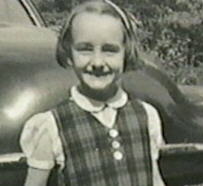
Bonny Bakley begins
Robert Blake went to bizarre extremes in his obsession
to control the woman he claimed he wanted nothing to do with, and amazingly
-- Bakley managed to dodge his bullets for quite some time. Say what you
will of her character, Bonny Bakley was a survivor. Having lived through
emotional, physical and sexual abuse as a child, Bakley survived to become
a smart and fairly happy person. Having lived through similar abuses as a
young adult, Bakley nonetheless survived to become a loving sister, valued
friend and mother.
Affable attorney Schwartzbach obviously felt uncomfortable reciting the
vindictive opening speeches his client originally wrote for Harland Braun
-- as well he should have. Schwartzbach's pointless, victim-bashing opening
statement stands as perhaps the most compelling testimony of Blake's demented
obsession with Bonny Bakley's demise jurors will ever hear.
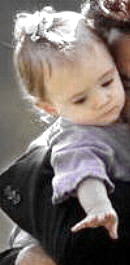
Baby Rose
begins
"It began as a plot to
physically remove Rosie's mother from her life by having Bonny arrested and
incarcerated or by physically keeping the baby away from her."
-- DA Samuels
"They're low-life trailer
trash that all made their living working for Bonny in her illegal schemes
to scam men."
-- Blake about Bakley's
family
"But he didn't want her
dead."
-- Schwartzbach defending
Blake
| "You have
to love the person you are going to play. You can't say, well, this guy killed
his family. I am going to play this ghoul. I have played a lot of people
who killed. I have been on Death Row. You know, I have never met a murderer
in my life. That's because there ain't any. There are people who crossed
the line. Some of us don't cross the line." -- Blake on his portrayal of killer, John List in "Judgment Day" |
CAMERA READY

Six Characters in Search
of a Murder
December 16,
2004
Despite Robert Blake's dramatic delay tactics and legal stunts, his murder
trial is set to open with a bang on December 20. Prosecutors have been ready
to roll for quite some time but one bizarre event after another has managed
to preempt the start of Blake's trial on charges that he successfully plotted
to kill his wife, Bonny Lee Bakley.
Casting has now been finalized, and joining Mr. Blake in the long-awaited
production will be his lawyer, Gerald Schwartzbach, and deputy district attorney,
Shellie Samuels. Superior Court Judge Darlene Schempp will direct.
In a trial that promises more plot twists than an episode of "KOJAK," the
characters will include aging Hollywood stuntmen, Gary McLarty and Ronald
Hambleton, both of whom Blake's attorney says are drug abusing, money-grubbing
liars with a history of criminality. Of course Blake is accused of being
much the same thing -- and far worse.
Which of the participants will eventually be found to be lying criminals
isn't known, but the character of the victim, Bonny Bakley, appears to have
already been set in stone. Bakley will be portrayed as a "scum of the earth"
grifter who deserved to be shot in the head at point blank range while sitting
quietly in her car.
One person who will not be making an appearance will be the man originally
charged as Blake's co-conspirator: Earle Caldwell. Charges against him were
dismissed due to insufficient evidence, however, BARETTA'S handyman may show
up in several flashback scenes.
At a recent hearing, DA Samuels waved around a paper that was seized from
Caldwell's car announcing it was a "shopping list for murder," and insisting,
"He wasn't just an employee but a close confidant and friend of the defendant
. . . Earle is involved in this up to his eyeballs."
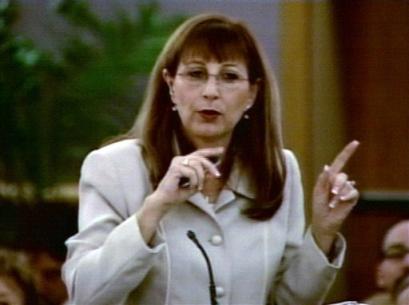
deputy district attorney,
Shellie Samuels
Caldwell will refuse to testify on his own behalf and plead "the fifth" --
a choice Robert Blake can't so easily make since he should have no trouble
expressing himself in a public forum and telling the truth he says he so
desperately wants everyone to hear. In fact, the trial has been repeatedly
postponed because the former TV star kept losing lawyers when he'd insist
on giving interviews and performing for the camera.
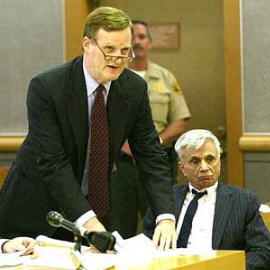
Blake's original attorney
Harland W. Braun
To be fair, not every delay has been Blake's fault. His murder trial, like
everything else in Blake's bleak past, has been plagued by strange and desperate
events.
On the day the jury was sworn in, robbers broke into Gerald Schwartzbach's
office and stole a computer containing what a court representative called
"the heart and soul of the defense case." The bandits and the computer were
quickly located. Now that those criminals have been brought to justice --
and the defense's heart and soul have been returned -- a search for truth
and justice in the matter of the cold-blooded murder of Bonny Lee Bakley
can finally begin.
Are you ready for your close-up, Mr. Blake?
NEXT !
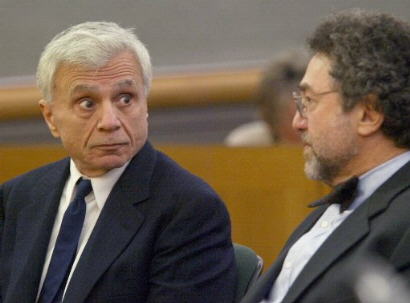
Gerald Schwartzbach, #4
March 1,
2004
San Francisco-based lawyer, Gerald Schwartzbach, 59, is the fourth lead attorney
to represent Robert Blake since the former TV detective's wife, Bonny Lee
Bakley, was shot to death outside Vitello's Restaurant three years
ago.
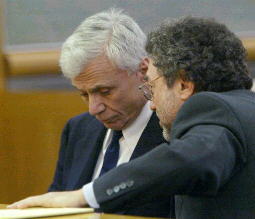
"I'm convinced of Mr. Blake's innocence," Schwartzbach said. Mr. Blake did
not speak to reporters about his new lawyer nor did he sing any showtunes.
The trial is set for September 9, 2004.
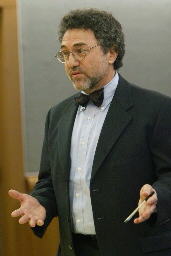
"This is a very interesting and challenging case and I think many experienced
lawyers would look forward to being involved in it."
-- Schwartzbach
Season
Cliff-Hanger
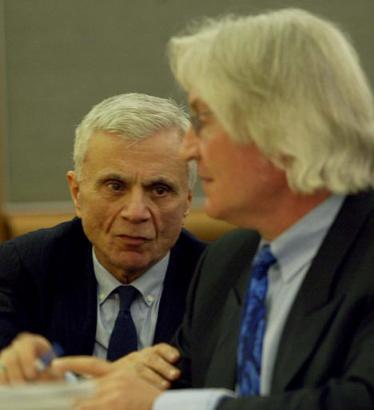
"irreconcilable
differences"
February 5, 2004
After an hour in chambers with Robert Blake and Thomas
Mesereau, Superior Court Judge Darlene Schempp returned to the bench and
announced a season cliff-hanger: "It appears to the court there are
irreconcilable differences ... and I've agreed to relieve Mr. Mesereau. I
understand the expense and the inconvenience. I'm sorry. I just did not have
a choice."
And with that dramatic line, the trial was postponed indefinitely. Mesereau
is the third defense lawyer to quit the case. Blake's original attorney,
Harland Braun, left in November 2002, and in January 2003, Jennifer Keller
followed him out the door.
"We're starting all over again," Judge Schempp said.
Prosecutors were stunned. "We had no idea this was coming," said Sandi Gibbons,
spokeswoman for the D.A.'s office. "It's like being punched in the stomach.
It's like having the rug pulled out from under us. We're a little shell-shocked
right now."
After the court session, Blake shared a few words with reporters and then
broke out into song.
"I'm very, very sorry, that Mr. Mesereau left.
I am deeply, deeply grateful to him for saving
my life. And more importantly, I am deeply
grateful to him for saving Rosie's life . . .
I'm sure Mr. Mesereau will have a great life and
a great career. I'm 70 years old. I've learned I
have to go forward. I've had an angel on my
shoulder since I was conceived. ... I wish him
all the very best."
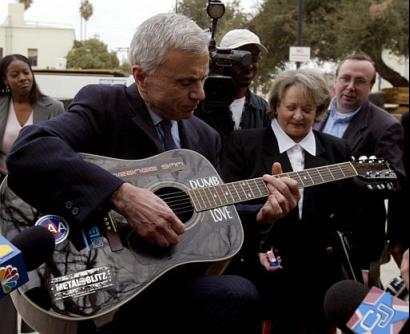
"Somewhere, over the rainbow,
Way up high..."
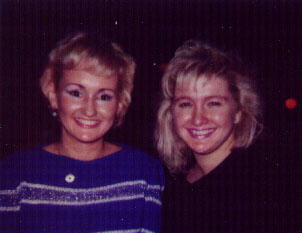
Bonny Bakley and sister Margerry
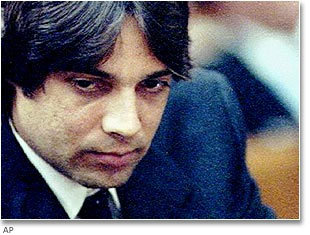
If Holly Could
Mr. Blake's defense team contends Christian Brando had ample motives for
wanting Bakley dead, particularly her announcement that a baby Bakley claimed
was fathered by Brando was actually Robert Blake's child.
However, the judge has limited such testimony, most of which was to come
in through evidence supplied by a woman deemed to have "credibility issues."
Justice Tricked
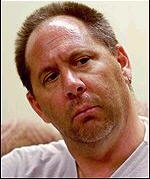
Caldwell Treated
Caldwell's Criminal Charges Called
Off
HALLOWEEN, 2003
Earle Caldwell -- Robert Blake's "handy man" -- composed a gruesome piece
of the darkest murder poetry ever penned. Caldwell admired his powerful poem
so much -- he kept it close at hand in his car's cup-holder for over half
a year. On this Halloween, the evil assistant to Bonny Bakley's twisted trickster
was given a delicious treat -- all charges against Caldwell were called off.
Regardless of the outrageous legal shocker, Earle's eerie poem remains one
of the most spine-tingling murder sonnets ever written.
| two shovels, a small sledgehammer, a crowbar, old rugs, duct tape, black pool acid, lye, get Blank gun ready 25 auto plant |
Lonely
Heart
Robert Blake's
plot to kill Bonny Lee Bakley
Link to Comments
- Page 1
| Vance Holmes.com / court |
| And Poetic Justice For All |